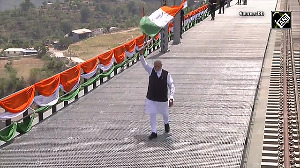David Petraeus, the United States general overseeing President George W Bush's surge in Iraq, talked cautiously of a rethink.
Against the backdrop of the horrific suicide bombings of Tuesday August 14 in the northern Iraqi town of Sinjar, when fuel trucks were detonated to kill up to 200 people and seriously injure another 300-plus members of the Yazidi, a Kurdish religious community, Petraeus said he will recommend reducing the number of American troops in Iraq by next summer.
The general however warned that any hasty, large scale withdrawal would precipitate disaster.
The surge in military strength that put 30,000 additional troops on the ground -- Bush's grand strategy to counter the daily onslaught of terrorism that has taken an increasing toll of American, and civilian, lives -- has caused considerable heartburn among the public, and provided Democratic presidential hopefuls a stick to beat the administration with.
In the face of mounting dissent and falling popularity ratings, Bush and Secretary of State Condoleezza Rice had, in July, suggested that the surge was being judged too hastily, and that it made sense to wait till September before taking a call on its success or lack thereof.
With that deadline less than a fortnight away General Petraeus - the man who will submit the official report on the strategy's success - has been quoted in the New York Times, and elsewhere, as saying the US footprint in Iraq would have to be "a good bit smaller by next summer".
His words are seen as an early indication that his much-anticipated report will not call the surge a success. However, General Petraeus is also quoted as saying he believes the surge should continue into next year, and warning that any quick withdrawal could surrender "the gains we have fought so hard to achieve".
'We know that the surge has to come to an end, there's no question about that. I think everyone understands that by about a year or so from now we've got to be a good bit smaller than we are right now,' Petraeus is quoted as saying.
'The question is how do you do that . . . so that you can retain the gains we have fought so hard to achieve and keep going. We are not at all satisfied where we are right now. We have made some progress but again there's still a lot of hard work to be done against the different extremist elements that threaten the new Iraq.'
Blaming al Qaeda for the attacks on the Yazidi community, Petraeus and other US officials charge that Syria has not actively policed its border with Iraq; that al Qaeda terrorists have been infiltrating through that porous border and carrying out the attacks particularly in the northern and northwestern parts of Iraq.
Petraeus told the NYT and a small selection of reporters in Baghdad that he and his staff were "trying to do the battlefield geometry right now" as he prepared his troop-level recommendations.
His report is expected to highlight the involvement of Sunnis in Anbar province in the battle against foreign Al Qaeda fighters when he delivers his progress report to Congress. The general calls it a significant development in America's counter-insurgency efforts.
'It's all about the local people,' he explains. 'When the local people are on the side of the new Iraq instead of on the side of the insurgents or even al-Qaida, that's a very significant change.'
A decision on the surge's continuance becomes imperative because the additional troops that made up the surge will have come to the end of their 15-month tour of duty by early spring of 2008, and there are not enough fresh troops at home to replace them and continue the surge strategy.






